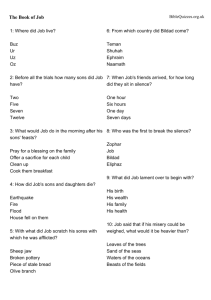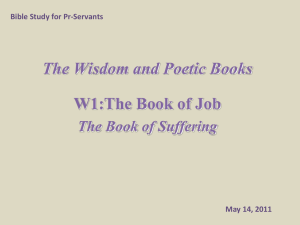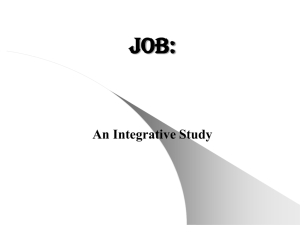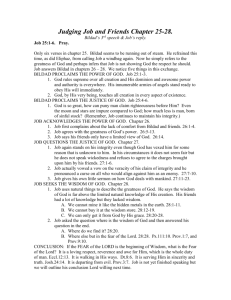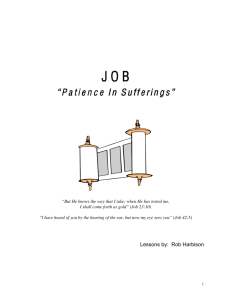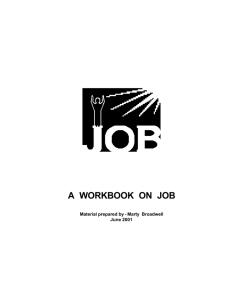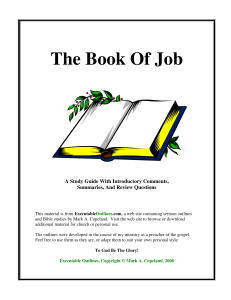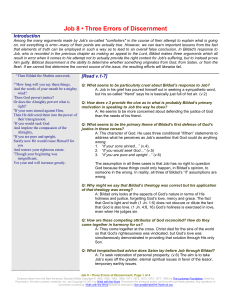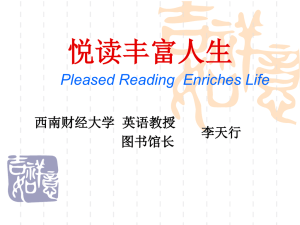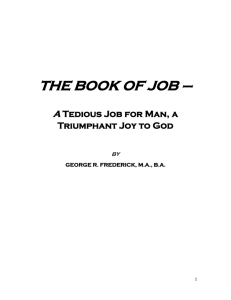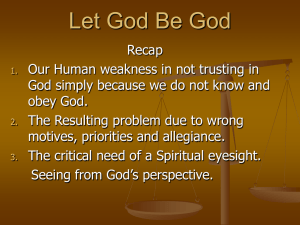Book of Job
advertisement
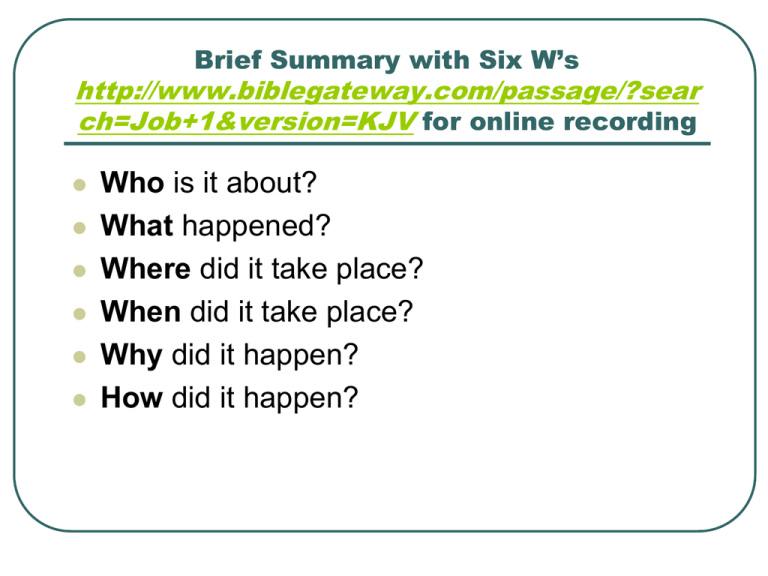
Brief Summary with Six W’s http://www.biblegateway.com/passage/?sear ch=Job+1&version=KJV for online recording Who is it about? What happened? Where did it take place? When did it take place? Why did it happen? How did it happen? The Inverted Pyramid From most newsworthy to the least From important stuff to fluff of no consequence Climactic order (Progressively Intensive) vs. the Inverted Pyramid Climactic order (Progressively Intensive) fits the law of Recency In the two rounds of trials/tortures of Job, the chronological order is intertwined with the climactic order; the Inverted Pyramid—from the most important or newsworthy to the least—fits for people on the run who may not have enough time to find out all the details; The Book of Job The Old Testament one of the books of the Hebrew Bible. It relates the story of Job, his trials at the hands of Satan with God’s permission, his discussions with friends on the origins and nature of his suffering, his challenge to God, and finally a response from God. The book is traditionally interpreted as a didactic poem sandwiched in a prose frame. The over-riding and oft-asked question asked in the book of Job is, "Why do the righteous suffer?" Prose vs. Poetry Natural Flow vs. Artistic flow the language in literature is stylized on purpose Prose is the most typical form of written language, applying ordinary grammatical structure and natural flow of speech rather than rhythmic structure (as in traditional poetry). Language in poetry is more intense and dense; Poetry has something else -- the poetic line. Poets decide how long each line is going to be and where it will break off out of his/her thematic/artistic concerns. Job’s name is associated with Patience, Steadfast, Perseverance, and Endurance 1. the central figure in an Old Testament parable of the righteous sufferer. 2. a book of the Bible bearing his name. 3. a male given name: from a hebrew word meaning “persecuted.” Note : Figuratively, any long-suffering person can be said to be “as patient as Job.” So don’t have a name like that since it implies your job is to go through a series of trials in life. Oxford English Dictionary (The name of) a patriarch of the land of Uz (for East), the eponymous protagonist of a book of the Old Testament and Hebrew Scriptures, taken as the type of extreme poverty, destitution, etc., or of patience and endurance. Freq. in similar phrases, as (as) patient as Job (also the patience of Job ), and (as) poor as Job . Part I: Job is tested (Chapter 1 & 2) Annotations on page 1 Eschew evil (to abstain or keep away from; shun; avoid: to eschew evil) Substance, material possessions or wealth: a man of substance Five hundred yoke of oxen = five hundred pairs of oxen/or 1000 oxen; Yoke is a device for joining together a pair of draft animals, especially oxen, usually consisting of a crosspiece with two bow-shaped pieces, each enclosing the head of an animal. Yoke To prevent bad things from happening “Doth Job fear God for nought?” (Old English for “nothing”) page 1 Job “rose up early in the morning, and offered burnt offerings according to the number of them all: for Job said, It may be that my sons have sinned, and cursed God in their hearts. Thus did Job continually” (Job 1.5). Job is buying security for his future, for his sons’ future. Job’s piety is associated with fear, of not out of fear. In his regard, Job shares his friends’ view; The concept of “reward and punishment” has been projected onto mother nature on the one hand and onto God on the other. We need to reassess our relationship with mother nature, among other things. We are not alone in this world. Sons (assistants) of God, including Satan (Job 1.6 or page 1) In the Book of Genesis, Yahweh is seen as the single deity, with "sons of elohim" as his assistants. Elohim is for "god" or "gods" in both modern and ancient Hebrew language. Satan in earlier usage means opponent, rival, adversary, not necessarily evil. Satan plays a role of persecutor of some sort; Satan’s challenge http://www.biblegateway.com/passage /?search=Job+1&version=NIV KJV for King James Version: “Then Satan answered the LORD, and said, Doth Job fear God for nought?” (Job 1.9). NIV for New International Version: “Does Job fear God for nothing?” Satan replied. It implies Job’s praying to God or his fear of God is associated with some motives, not entirely free from benefits or reward, thus Job is not in an autonomous state; rather, he is in a heteronomous state in Kantian term. In other words, he is not doing this for its own sake. Three-Part Structure Poetry sandwiched in between prose The book of Job has a fairly simple structure. Job 1 and 2 are the prologue, written in prose. Job 3:1-42:6 is poetry that consists of a cycle of speeches between Job, Eliphaz, Bildad, Zophar and later Elihu, and then the dialogue between Yahweh and Job. Job 42:7-14 is the epilogue, which is written in prose. Speech cycles Cycle 1 Cycle 1 Job Chapters 3 Eliphaz 4-5 Job 6-7 Bildad 8 Job 9-10 Zophar 11 Cycle 2 Cycle 2 Job Chapters 12-14 Eliphaz 15 Job 16-17 Bildad 18 Job 19 Zophar 20 Cycle 3 Cycle 3 Job Chapters 21 Eliphaz 22 Job 23-24 Bildad 25:1-5 Job 26; 27-28; 29-31 The third cycle, it should be noted, does not follow the pattern of the first two cycles. Zophar does not give a speech and Bildad's speech is significantly shorter than his previous speeches. Soliloquy noun, plural -quies. 1. an utterance or discourse by a person who is talking to himself or herself or is disregardful of or oblivious to any hearers present (often used as a device in drama to disclose a character's innermost thoughts): Hamlet's soliloquy begins with “To be or not to be.” 2. the act of talking while or as if alone. Job’s Soliloquy Chapter 3 disregardful of or oblivious to any hearers present Having sat in silence for seven days in the presence of his friends who had come to comfort him, Job finally speaks. In the form of a soliloquy, he begins by cursing the day of his birth and the night of his conception for failing to prevent his sorrow (3.1-10). He then bemoans why he did not die at birth or even be stillborn, for then at least he would be at rest, just like those who were great in their lifetime, or like those who had been oppressed (3.11-19). Job also wonders why the suffering who long for death are allowed to linger. He concludes by stating that what he most greatly feared has now come upon him: trouble, from which there seems to be no rest (3.20- Monologue vs. Soliloquy Implied audience [C17: via French from Greek monologos speaking alone] In theatre, a monologue (or monolog) is a speech presented by a single character, most often to express their thoughts aloud, though sometimes also to directly address another character or the audience. Monologues are common across the range of dramatic media (plays, films, animation, etc.). It is distinct from a soliloquy, which is where a character relates his or her thoughts and feelings to him/herself and to the audience without addressing any of the other characters. Unity through Variety (page 4) Let darkness and the shadow of death stain it; let a cloud dwell upon it; let the blackness of the day terrify it (Job 3.5). “Because it shut not up the doors of my mother's womb, nor hid sorrow from mine eyes” (Job 3.10). “Why died I not from the womb? why did I not give up the ghost when I came out of the belly?” (Job 3.11). To curse the making of himself, Job is indirectly cursing the maker. “What did I do wrong?” Job associated his punishment with sins, though in this case, the punishment is groundless. General vs. Specific Regarding Question 1 in the worksheet Identify a general theme that runs through talks of Job’s three friends—what’s in common? What is the pattern? Summarize this in an umbrella term, overarching your argument at the beginning. Then be specific/accurate on each friend’s charge of Job; Quote textual evidence; Karen DiYanni’s example You need to follow up on Question 1! Regarding why Job was punished, his friends have different interpretations: Eliphaz claims that…; moreover, Bildad assumes that…; the last but not the least is Sophar’s charge that… In short, they’ve all assumed one way or another Job must have done something wrong to deserve all this. Their charges are tied to the notion of reward and punishment. (This is a more general statement to sum up the main point.) On how to interpret Kafka’s fiction, Karen DiYanni states that “Some interpreters have emphasized the religious aspect of Kafka’s novels and stories (Spann 59). Others have claimed that his fiction should be interpreted from the standpoint of Freudian psychoanalysis (Greenberg 47). Job’s friend No. 1: Eliphaz (vs. Job) (4:1-7:21); Eliphaz is a leader Eliphaz’s charge is not warranted since he has simply made some assumption. “Remember, I pray thee, who ever perished, being innocent? or where were the righteous cut off?” (Job 4.7). (Course Reader 5) Rhetorical question: asking back, not expecting an answer since the answer is pre-programmed in the question. “being innocent,” as a condition, meaning “if”; This means if Job were innocent and righteous, he wouldn’t have been punished like this. This implies that Job must have sinned. The concept of “reward and punishment” has been extended beyond the human world. Job’s Friend No. 1 Eliphaz the Temanite “Remember, I pray thee, who ever perished, being innocent? or where were the righteous cut off?” (5) Eliphaz the Temanite starts with expressing his view that the innocent don't suffer, the wicked do. As support for his position, he refers to a vision that he had. Chastening Job, Eliphaz then directs Job to seek God's forgiveness, reminding him of the blessings that would come if Job repented (4:1-5:22). Eliphaz: You get what you’ve sowed (page 5) “Even as I have seen, they that plow iniquity, and sow wickedness, reap the same” (Job 5.8). “By the blast of God they perish, and by the breath of his nostrils are they consumed” (Job 5.9). Ironically this seems finger-pointing at God. As a matter of fact, many sinners are still at large! Here the human desire for reward and punishment is projected onto God. But God has other jobs to do, if there is a god. The human society is only a small part of the entire universe. Eliphaz’s Dream page 5-6 subtly charging Job of being arrogant 15: Then a spirit passed before my face; the hair of my flesh stood up: 16: It stood still, but I could not discern the form thereof: an image was before mine eyes, there was silence, and I heard a voice, saying, 4.17: Shall mortal man be more just than God? shall a man be more pure than his maker? (Rhetorical question that implies of course not). This implies that Job is too arrogant, thinking himself more just than God. But in this case, who is more just: Job or God? A great deal of irony? Eliphaz’s defense of God page 7 God is patient! “He shall deliver thee in six troubles: yea, in seven there shall no evil touch thee” (Job 5.19). New International Version (©1984) From six calamities he will rescue you; in seven no harm will befall you. New Living Translation (©2007) From six disasters he will rescue you; even in the seventh, he will keep you from evil. Job’s self-defense page 9 Job. vs. Eliphaz 22: Did I say, Bring unto me? or, Give a reward for me of your substance? (I did not ask for all this trouble myself in the first place!) 23: Or, Deliver me from the enemy's hand? or, Redeem me from the hand of the mighty? 24: Teach me, and I will hold my tongue: and cause me to understand wherein I have erred. 29: Return, I pray you, let it not be iniquity; yea, return again, my righteousness is in it. Speeches of Job Job, confident of his own innocence, maintains that his suffering is unjustified as he has not sinned, and that there is no reason for God to punish him thus. However, he does not curse God's name or accuse God of injustice but rather seeks an explanation or an account of his wrong doing. Job’s Friend No. 2 Bildad the Shuhite (8:1-10:22) Bildad the Shuhite now steps in and rebukes Job for his strong words. Maintaining that God is just, he implies that Job's sons died because of their own transgressions, and if Job were only pure and upright he would be blessed by God. Appealing to wisdom of the ancients, he contends the wicked are without support, and that God will not cast away the blameless. If Job would only repent, God would fill him once again with laughter and rejoicing (8:1-22). Faith vs. Reason page 10 Bildad’s fallacious argument “Doth God pervert judgment? or doth the Almighty pervert justice?” (Job 8.3). New International Version (©1984) Does God pervert justice? Does the Almighty pervert what is right? Judgment by a general pattern already established, failing to take into consideration of a specific context; Refuse to examine a specific case, simply assuming that some authoritative figure must be right, regardless… (fallacious argument) “If thy children have sinned against him, and he have cast them away for their transgression” (Job 8.4). THE COUNSEL OF BILDAD (8:1-22) 1. Introductory remarks (1-7) a. He rebukes Job for his words b. He maintains that God deals justly c. If Job's sons sinned, they were killed for their transgression d. Restoration would occur if Job would only seek God and repent Bildad appeals to the wisdom of the ancients (8-18) a. Heed what others have already learned, for our time is short b. The wicked are like the papyrus with no support, for they soon wither c. God will not cast away the blameless, nor will He uphold the evildoers (the implication is "Job, you are not blameless") “Behold, God will not cast away a perfect man, neither will he help the evil doers” (Job 8.20). d. God will yet restore Job (assuming he repents) (foreshadowing God’s two-fold restoration at the end, except that the new set of children was not the same!) Job agrees but argues that… Use “Ctrl F” for Find to access any quote KJV: “I know it is so of a truth: but how should man be just with God?” (Job 9.2) (rhetorical move: make a concession, then turn against it…) Is it an agreement or objection then? Page 12 in the course raeder New International Version (©1984) "Indeed, I know that this is true. But how can a mortal be righteous before God?” The relationship between God and man is not equal. The word “covenant” doesn’t refer to a contract that is based on equality. A covenant is based on the conditional promises made to humanity by God, as revealed in the Scripture. Yes, God is powerful, but is God accessible? Do I get a chance to reason with God face to face? Job provides numerous examples of God's power Because of such power, Job's complains of God's inaccessibility (9:14-20) Later when Job did get an audience from God, it was quite surprising to Job. This was when Job became humbled. “For he [God] is not a man, as I am, that I should answer him, and we should come together in judgment” (Job 9.32). “Neither is there any daysman (umpire/mediator) betwixt us, that might lay his hand upon us both” (Job 9.33). Job is perplexed (page 14) he reasons from his own assumption/perspective “This is one thing, therefore I said it, He destroyeth the perfect and the wicked” (Job 9.22). (This is a perspective from human beings, not from God; in other words, this is something that human beings have projected onto God. It implies that God is supposed to do what we human beings have assumed! What subjectivity! What arrogance!) Parable of Zhuangzi—who needs your hats? “Neither is there any daysman betwixt us, that might lay his hand upon us both” (Lob 9.33). Daysman: Archaic: an umpire; mediator. “I am full of confusion” (Job 10.15). Job’s third friend: Zophar the Naamathite (15) Zophar the Naamathite enters the dialogue 1. with his own rebuke of Job for his rash words. Indicating that 2. Job has actually received less suffering than he deserves, 3. he reproaches Job trying to search out the deep things of God. Instead, Job should be putting away iniquity and wickedness, for then he would abide in brightness, security and hope (11:1-20). Job vs. Zophar (the third friend) He chides his accusers (12:1-12) He affirms God's own wisdom and strength (12:1325) The advice of his friends has been no help (13:1-12) Confident of his own integrity, Job again wishes to speak with God (13:13-19) Job appeals to God for an audience (13:20-28) He expresses hopelessness in this life (14:1-12) He longs for death (14:13-22) Job’s “Comforters” (Irony) A person who tries to console or help someone and not only fails but ends up making the other feel worse. In the Old Testament, a man whose faith was severely tested by Satan, with God's permission. Job was the most prosperous and happy of men, who faithfully praised God for God's goodness. In order to get him to curse God, Satan destroyed all that Job owned, killed his children, and struck Job himself with vile sores from head to toe. False friends of Job's suggested that he should abandon his beliefs ( see Job's comforters). But even in absolute misery, Job would not curse God, saying instead, “The Lord gave, and the Lord hath taken away: blessed be the name of the Lord.” As a reward for his steadfast faith, God healed Job and “gave him twice as much as he had before.” Job’s Friends (including Job): God always rewards good and punishes evil Job's friends do not waver from their belief that Job must have sinned one way or another to incite God's punishment. As the speeches progress, Job's friends increasingly berate him for refusing to confess his sins, although they themselves are at a loss as to which sin he has committed. They also assume, in their view of theology, that God always rewards good and punishes evil, with no apparent exceptions allowed. There seems to be no room in their understanding of God for divine discretion and mystery in allowing and arranging suffering for purposes other than retribution. Tema 8 south; desert, one of the sons of Ishmael, and father of a tribe so called (Gen. 25:15; 1 Chr. 1:30; Job 6:19; Isa. 21:14; Jer. 25:23) which settled at a place to which he gave his name, some 250 miles south-east of Edom, on the route between Damascus and Mecca, in the northern part of the Arabian peninsula, toward the Syrian desert; the modern Teyma'. Sheba 8 1. Queen of, the queen who visited Solomon to test his wisdom. I Kings 10:1–13. 2. Biblical name of Saba ( def. 2 ) . Wesley's Notes for Job 6:19 6:19 Tema - This place and Sheba were both parts of the hot and dry country of Arabia, in which waters were very scarce, and therefore precious and desirable, especially to travellers. Companies - Men did not there travel singly, as we do, but in companies for their security against wild beasts and robbers. Arcturus 12 a first-magnitude star in the constellation Boꞌötes, a constellation in the northern sky, located between 0° and +60° declination, and 13 and 16 hours of right ascension on the celestial sphere. The name comes from the Greek Βοώτης, Boōtēs, meaning herdsman or plowman (literally, ox-driver; from boos, related to the Latin bovis, “cow”). Orion 12 Astronomy--the Hunter, a constellation lying on the celestial equator between Canis Major and Taurus, containing the bright stars Betelgeuse and Rigel. Classical Mythology--a giant hunter who pursued the Pleiades, was eventually slain by Artemis, and was then placed in the sky as a constellation. Pleiades 12 Classical Mythology--seven daughters of Atlas and half sisters of the Hyades, placed among the stars to save them from the pursuit of Orion. One of them (the Lost Pleiad ) hides, either from grief or shame. Astronomy . a conspicuous group or cluster of stars in the constellation Taurus, commonly spoken of as seven, though only six are visible. The chambers of the south 12 http://www.biblestudytools.com/commentaries/wesley s-explanatory-notes/job/job-9.html?p=2 Arcturus is a northern constellation, near that called the Bear. Orion is a more southerly constellation, that rises to us in December. The Pleiades is a constellation not far from Orion, which we call the seven stars: by the chambers, (or inmost chambers, as the word signifies) of the south, he seems to understand those stars and constellations which are toward the southern pole, which are called inward chambers, because they are for the most part hid and shut up from these parts of the world. Elihu enters the scene Chapter 32-37 (page 44) disciplinary vs. punitive Angry with Job justifying himself rather than God, and by the inability of Job's friends to provide an answer, Elihu feels compelled to speak (32:1-33:7). He takes issue with Job's claim of innocence while charging God with counting him (Job) as His enemy. He proposes that God often uses various means to keep man from death ("the Pit"), including chastening with pain. Therefore Job should be looking at suffering as a disciplinary measure from a loving God, not as a punitive measure from one's enemy (33:8-33). Elihu's speech (page 44) The bulk of Elihu's speech then focuses on the justice of God, which Elihu feels Job has maligned. Elihu charges Job with adding to his sin by multiplying words against God without knowledge (34:1-35:16). He concludes his speech with an effort to speak on God's behalf and by ascribing righteousness to the Almighty. This he does by reviewing God's justice and majesty. The former as seen in His dealings with man, the latter as seen in His dealings in nature. With an admonition for Job to stand still and consider the wondrous works of God, Elihu seems to be preparing Job for what is about to follow (36:1-37:24). Elihu is Angry because… He is angry at both Job and his three friends (32:2b-5) a. At Job, because he justified himself rather than God b. At his friends, because they provided no real answer and yet condemned Job c. He had waited to speak because of his youth, but the silence from the three men made him angry ELIHU'S RESPONSE TO JOB (33:8-37:24) Job, you are wrong in charging God as your enemy (33:8-13) God uses various ways to speak to man (33:14-28) God's purpose is disciplinary, not simply punitive (33:29-33) Elihu proclaims God's justice (34:1-37) Elihu condemns Job's reasoning (35:1-16) Elihu vs. Job and his Three Friends Fundamentally, they assume God punishes evil doers and reward the good guys; “Work for hire” is deeply rooted Elihu maintains God’s impartiality; God’s Reply Chapter 38 page 53 Yahweh a name of God, transliterated by scholars from the Tetragrammaton and commonly rendered jehovah. Tetragrammaton--the Hebrew word for God, consisting of the four letters yod, he, vav, and he, transliterated consonantally usually as YHVH, now pronounced as Adonai or Elohim in substitution for the original pronunciation forbidden since the 2nd or 3rd century b.c. God Speaks, Job Is Humbled At last, Job is finally given his desire to have an audience with God. It is not what he expected. Speaking from a whirlwind, the Lord charges Job with darkening counsel by words without knowledge. A challenge is then made for Job to answer questions posed to him. A series of questions follow in rapid succession regarding the creation and nature that certainly contrast God's great power and wisdom with Job's limited ability and understanding. God ends His first discourse then with a repeated challenge for the one (i.e., Job) who contends with the Almighty and who rebukes God to answer these questions. Overwhelmed, Job admits his unworthiness and inability to answer. He admits he has spoken before, but will do so no more (38:1-40:5). God’s second discourse A second discourse begins with another challenge for Job to answer God's questions. Job is asked whether he truly thinks he can annul God's judgment, or condemn Him so that he can be justified (cf. Elihu's charges, 32:2; 33:8-13). If Job can thunder with a voice like God's, adorn himself with majesty, splendor, glory and beauty, bring the proud down low, then God would confess that Job could save himself. To once more illustrate the power and wisdom of God, Job is asked to consider two great creatures, the behemoth and Leviathan. If man is fearful before them, how then could one stand against God (40:6-41:34)? Job's final response Job's final response is to humbly acknowledge God's ability to do everything, and that no purpose of His can be withheld from Him. He also confesses that he has spoken of things he did not understand, and beyond his ability to comprehend. Having now heard and seen God, Job abhors himself and repents (42:1-6). Mazzaroth 54 Mazzaroth (Mazarot , ַמזָּרֹותLXX μαζουρωθ) is a hapax legomenon of the Hebrew Bible, found in Job 38:31-32. The similar word mazalot ( ( ַמזָֹּלותin 2 Kings 23:3-5 may be related. prognostications, found only Job 38:32, probably meaning "the twelve signs" (of the zodiac), as in the margin (comp. 2 Kings 23:5). 6th-century depiction of the zodiac, mosaic in Beit Alpha, Israel. Restorative Justice At the end, God doubled what Job has lost, including a new set of children (irony). “After this lived Job an hundred and forty years, and saw his sons, and his sons' sons, even four generations” (42.16). “So Job died, being old and full of days” (42.17). Job is rewarded with longevity. The Book of Wisdom The Book of Wisdom, often referred to simply as Wisdom or the Book of the Wisdom of Solomon, is one of the deuterocaꞌnonical books of the Bible. It is one of the seven Sapiꞌential or wisdom books of the ꞌSeptuagint Old Testament, which includes Job, Psalms, Proverbs, Ecclesiastes, Song of Solomon (Song of Songs), and Sirach. What lesson can we learn from Job? 1. “work for hire”—doing something not for its own sake, but for the benefits/reward attached/derived 2. Projecting a human law onto mother nature, God and other domains— insensitivity/arrogance/being self-centered; 3. reposition ourselves in the universe; Far East—from whose point of view? The Central Kingdom Delphi—a point heaven and earth meet
